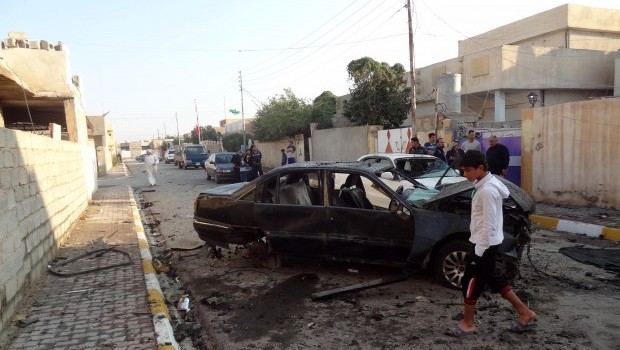
An Iraqi looks at damages on the site of a car bomb attack on November 14, 2013 in the northern city of Kirkuk. Attacks against Shiites, including a suicide bombing that ripped through a religious procession, killed 39 people despite massive security deployed to protect pilgrims marking one of the holiest days of their faith. (AFP PHOTO MARWAN IBRAHIM)
No group immediately claimed responsibility for the attack, which came on the day of Ashura, a holy ritual when Shi’ites commemorate the death of Imam Hussein, a grandson of Prophet Mohammad.
The bomber, who wore a police uniform, detonated an explosives belt in a crowd of pilgrims, who were mainly Shi’ite Kurds, the sources said. Most of the wounded pilgrims were taken to hospitals in Iraq’s northern Kurdistan region.
“I was near a group of pilgrims and suddenly I heard a big explosion,” Kadhim Al-Zarkooshi, 47, a taxi driver who was injured in the attack told Reuters at the hospital.
“Dust and smoke covered the area, then I found myself surrounded by corpses and wounded people, they were crying for help.”
Shi’ites are considered apostates by hard-line Sunni Islamist insurgents who have been regaining momentum in Iraq this year. On Wednesday at least 19 people were killed in similar bomb attacks targeting Iraqi police and pilgrims.
The government blames Al-Qaeda for the rise in violence in the country, saying it seeks to destabilize the Shi’ite-led government and foment inter-communal conflict.
Insurgent attacks in Iraq have risen since the start of the year, with hundreds killed each month. The growing violence has raised fears of a return to the heights of bloodshed seen in 2006-7, when tens of thousands died.
Iraq’s sectarian balance has come under further pressure from the civil war in neighboring Syria, where mainly Sunni rebels are fighting to topple a leader backed by Shi’ite Iran.
So far Shi’ite militias, most of which disarmed in recent years and joined the reconstituted security forces or entered the political process, have largely held their fire.
But a worsening Sunni insurgency could prompt Shi’ite militia to again take up arms to defend themselves.
